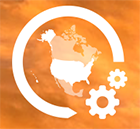As climate continues to change and adaptations become a necessity, building resilience is of utmost importance to communities. Resilience includes knowing the hazards, assessing vulnerability and risk, investigating options, and prioritizing and planning before finally taking action. A science-based triage approach aids in these efforts, while narratives from communities aid in promoting more engagement and action at local levels.
Toward this end, the US Climate Resilience Toolkit has compiled such narratives, as well as case studies and reports, and developed online interactive tools in partnership with scientists, experts and community leaders, to better inform stakeholders of what lies ahead and how to best prepare. The Toolkit includes vetted information from the Fourth National Climate Assessment and covers multiple regions across the US. In September 2021, the new Northern Great Plains Region was unveiled, which includes the states of Montana, Nebraska, North Dakota, South Dakota and Wyoming. Members and partners of the NC CASC, including Laura Edwards, Imtiaz Rangwala, James Rattling Leaf, Sr. and Stefan Tangen, contributed detailed new sections on the risks, challenges and adaptation to changes in water, ecosystems and biodiversity, and impacts to Indigenous people.
Variability in precipitation due to climate change is causing droughts and floods, creating hazardous conditions for the lands and the people dependent on them. The Northern Great Plains region is of particular importance given its crop growing and livestock grazing, which provides the US with a critical supply of food. When the Northern Great Plains region struggles, we all feel it down the supply chain. Warmer temperatures and the potential for more extreme precipitation events will only exacerbate challenges in this region in the future, as well as negatively impact ecosystems and agricultural production.
Climate and hydrologic challenges are already harming tribal economies and livelihoods, prompting proactive strategic climate change planning. Read about the Climate Change Summit, which was led by the Standing Rock Sioux Tribe on September 9 – 10, 2021. Continued scenario planning and transboundary collaboration, as well as partnerships with experts in scientific fields relevant to climate change will help shape future efforts in natural resource management, water rights, and energy development in the region.
The stories – and the solutions – of climate change belong to all of us. The more we all understand about the problems facing the planet and us, the better positioned we will be to do something about it. Click to check out the reports, case studies and interactive tools that have been developed for the Northern Great Plains region and click for more insights specifically tied to water, ecosystems and indigenous peoples.


